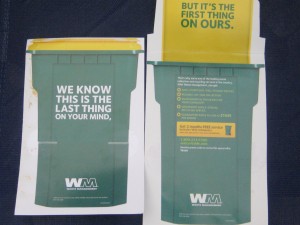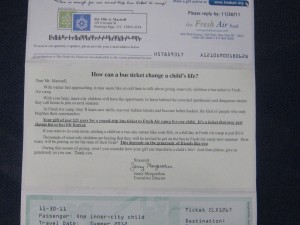Here are two very different direct mail efforts that make the same mistake: apologizing to the reader. They don’t come right out and say “I’m sorry”, but the self-effacing entry points have the same effect. And by choosing this approach for their entry they’ve given up the opportunity to have another, much stronger intro.
Waste Management says “We know this is the last thing on your mind… but it’s the first thing on ours.” With the reveal of the opening trash can lid. Well, no. If it’s the last thing on my mind then why are you talking about it? If I don’t care about it then I am not going to read your promo about it.
The Fresh Air Fund sent me an address sticker package to solicit money to send inner city kids to camp. There’s actually some good copy here but not the first sentence of the letter: “With winter fast approaching, it may seem like an odd time to talk about giving inner-city kids a bus ticket to Fresh Air camp.” Well, yes it does. Maybe you should come back and talk to me in the spring.
Or maybe you should lead with the stronger second sentence: “With your help, inner-city children will have the opportunity to leave behind the crowded apartments and dangerous streets they call home and join us next summer.” Or, maybe turn the timing of the appeal into a motivator: “We have to work all year long to make sure that inner city kids have the chance to spend a few summer weeks at camp. That’s why we’re writing you today.”
What’s happening in both these efforts is that the copywriter is implicitly apologizing for the intrusion. But the reader doesn’t care because advertising mail is a lower life form than a cockroach. All the reader wants to do is throw it away. And all you can do to save yourself is to deliver a powerful offer or a truly intriguing proposition that will interrupt that trajectory toward the recycling bin. The Uriah Heep act just doesn’t cut it.

